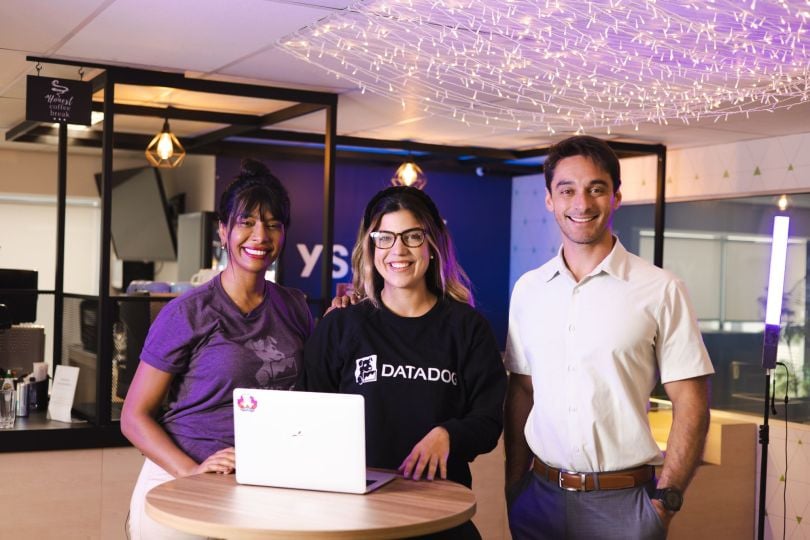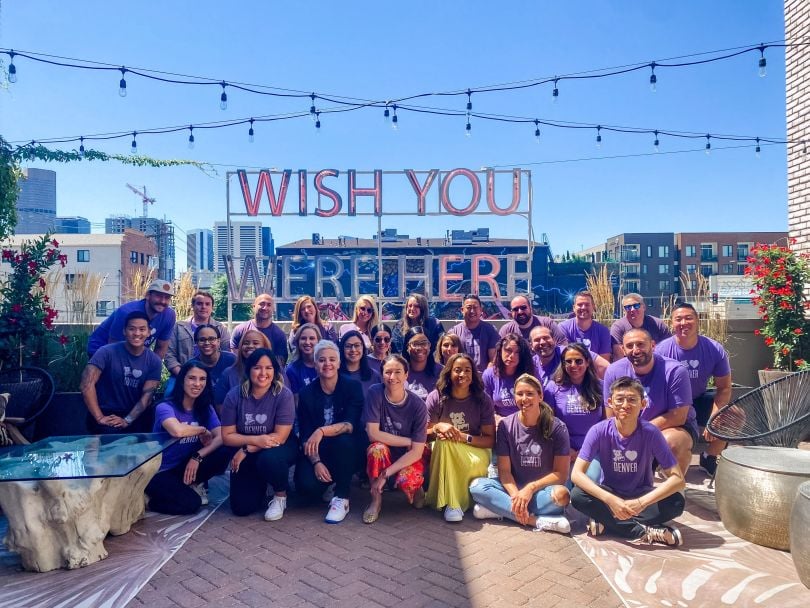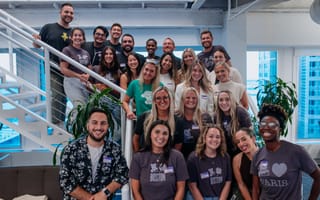When it comes to learning and development, Datadog wants to meet its people where they are — both literally and figuratively.
According to Senior Manager of Talent Development Jamie Bridge, this focus on growth begins the moment new hires join the company. During the onboarding process, new team members travel to one of the company’s offices, where they have the chance to connect with coworkers in person and receive a crash course on Datadog — everything from its product to its culture.
“To some extent, every new hire who comes in the door gets a really unique and tailored onboarding experience, depending on what role and region they’re in,” Bridge said.
Datadog understands that growth looks different for everyone, which is why the company aims to offer a wide variety of opportunities, from large-scale collaborative events to self-paced, individualized learning.
“We try to keep things scalable and flexible,” Bridge said. “Having a growth mindset is huge here, and if we’re going to say that, we need to give people tools and resources to actually live it.”
“Having a growth mindset is huge here, and if we’re going to say that, we need to give people tools and resources to actually live it.”
While many of these resources are accessible for all individuals across the company, some are tailored to certain team members, depending on their role. Two of the company’s fastest-growing departments, sales/customer success and engineering, offer unique and immersive professional development opportunities.
For Manager of Engineering Enablement Michael Perotto, helping developers grow involves both encouraging collaboration and individual development. From a two-week onboarding program to brown-bag lunch gatherings, engineers get the chance to continuously expand their knowledge and learn from their peers.
“We provide education that’s standard across all engineering teams while helping each team develop its own individual skill set,” Perotto said.
Like their peers in engineering, the company’s sales and customer success team members also start their Datadog journeys with a robust onboarding program before diving into more role-specific training. Director of Sales Enablement Curriculum and Strategy Jessica Shyu explained that the vision is for sales professionals to engage with shorter, on-demand educational opportunities in addition to larger milestone events.
“We know that sellers need and want to always be developing themselves,” she said. “We need to help them level up and gain better skills.”
These efforts to drive evolution, both on a team- and company-wide level, all reflect how L&D isn’t simply an add-on to Datadog’s culture — it’s ingrained into it. By giving employees ongoing training and support, the company enables its people to thrive and help others do the same.
ABOUT DATADOG
Datadog aims to break down silos and reduce complexity by enabling organizations to harness digital transformation, cloud migration and infrastructure monitoring across their tech stacks. The company’s platform is designed to drive stronger collaboration, accelerate time to market for applications, track key business metrics and more.

Diving Into the Dev Details
Considering the robustness and complexity of Datadog’s platform, the work that goes into building it is far from simple.
That’s why the company’s engineers dive into the details right as they join their team. Perotto explained that the onboarding program serves as an introduction to the tooling and languages engineers will leverage in their roles. During this time, new hires attend courses alongside their peers and spend time getting acquainted with their individual teams.
Once engineers get settled into their roles, there are plenty of opportunities for them to refine their skills and share knowledge with their peers. For example, Perotto shared that it’s common for engineers to demo their work each week and regularly engage in lunch-and-learn sessions. “These efforts are self-organized by the engineers, which is really nice to see,” he said. “There’s a lot of eagerness to do all of that.”
“It’s common for engineers to demo their work each week and regularly engage in self-organized lunch-and-learn sessions.”
Perotto noted that one of the most impactful growth opportunities available to engineers are their team’s yearly summits. These conference-style events bring large teams of developers together for several days to hear talks from their teammates and leaders, as well as to brainstorm ways to enhance engineering processes.
Apart from these various initiatives, Perotto and other leaders are focused on helping engineers more effectively navigate their career paths. Whether developers desire to be individual contributors or engineering managers, Perotto’s team aims to ensure they have the right training in place to help them build certain skills around tooling, languages and much more.
As Perotto and others strive to create a strong learning culture for engineers, they’re taking time to collect survey data across all their programs to ensure their efforts align with team members’ needs and desires. Their ultimate goal is to establish a structured learning request process that encompasses the organization’s engineering teams.
“We’re developing ways to make it easier for team members to provide feedback and come to us with new ideas,” Perotto said.

A Strong Sales Foundation
“If you don’t measure it, it doesn’t matter.”
This philosophy guides Shyu’s approach to managing and improving the training and resources available to the company’s sales and customer success teams. In addition to leveraging the Kirkpatrick model to measure the impact of their programs, she meets with the company’s chief revenue officer and other sales and customer success leaders to garner feedback.
What L&D programs are Shyu and her peers measuring? She said it all starts with “sales foundations,” which are in-depth, multi-day programs that typically begin the first week following companywide onboarding.
“We use sales foundations to go deep into very specific sales skills that are necessary at different stages,” Shyu explained.
During sales foundations, team members come together at their regional office to learn about the company’s sales methodology, its data, the product itself and how the teams collaborate. New hires also take part in live training sessions within sales foundations, led by their managers and peers.
Besides these opportunities, Shyu said, sales and CS team members also engage with e-learning pathways to learn more about the company’s product and sales approach.
Yet learning doesn’t end once a new team member has been fully onboarded. Shyu said that’s why her team is building out an “ever-boarding program,” which is designed to help individuals continuously grow as processes and tools change over time.
She added that leadership training is the “biggest ask” she receives from sales and CS team members, and there’s a reason for that.
“We can design all of the individual contributor training that we want for sales and CS teams, yet when they leave the training room and go back to their day-to-day roles and their leaders don’t reinforce the training, then it kind of goes by the wayside,” she explained. “Leaders are critical partners at every stage of enablement.”
To ensure leaders reinforce trainings, Shyu’s team recently rolled out a new set of sessions called “leader labs,” during which people managers learn how to analyze a discovery call and then couple that knowledge with the skills they learned during companywide leadership training.
“Not only are they learning how to analyze a discovery call, but they’re learning how to prioritize feedback and use a central framework to coach and share feedback with their teams regarding how to change behaviors,” she said.

Unlocking Education For Everyone
Of course, not everyone who works at Datadog sits on one of its engineering and sales teams — yet that doesn’t mean those in other departments have to miss out on engaging educational opportunities.
According to Bridge, “learning weeks” offer all employees access to a wide range of skill- and growth-based events, which they can either participate in or volunteer to run themselves.
“They provide a growth opportunity for the trainers as well as the learners,” she said.
Each learning week covers different topics, which are based on business needs and employee interest. Bridge said past topics include new technology training, internal mobility and personal branding.
Another focus of Datadog’s learning culture centers around topics of equity and inclusivity in the workplace. Bridge noted that this facet of the workplace environment is often interwoven into the company’s L&D opportunities.
“We believe that every single employee has a role to play in advancing DEI, so we bring employees together in multiple live workshops to discuss what inclusion and allyship look like and how we expect these behaviors to show up at work,” she said.
DEI is important for Datadog, considering the company has employees in 32 offices located in countries across the globe. Shyu explained that, as the organization scales its L&D offerings, they’re making sure that all languages and cultural nuances are considered.
“We’re thinking about how we make sure that, as we develop centralized content from our headquarters, it’s actually digestible and applicable to our teams across regions,” she said.
ONE-ON-ONE SUPPORT
To ensure all new hires are properly set up for success, Datadog pairs each one with an onboarding mentor and buddy, who serve as go-to points of contact during their first few months on the job. “This allows them to start building their network of connections, with the goal of making every employee feel prepared, supported and included,” Bridge said. Perotto added that these mentor-mentee relationships are managed in Workday, which makes it easier for both parties to stay on the same page. “It makes for a far more transparent, simpler experience,” he said.
‘A Grounded Sense of Self’
A culture that fosters continuous growth doesn’t create itself. Rather, it relies on the right type of people to bring it to life.
First and foremost, Bridge said, a growth mindset is essential for all team members at Datadog, as they must be willing to try new things and adapt when needed. But besides that, it’s also important for employees to be humble.
“In the learning space especially, it’s important to admit what you don’t know and work to improve on that, help others learn and come in with a really grounded sense of self,” Bridge said.
It’s important to admit what you don’t know and work to improve on that, help others learn and come in with a really grounded sense of self.”
Given how much time employees spend growing together, Shyu added, it’s critical for team members to thrive in a collaborative setting.
“We’re going to hire people who have the right technical skills, but if you don’t know how to play well with others and get work done as a team, we’re not going to be able to move very far,” she explained.
Datadog’s learning-focused culture is multifaceted, fostered by a product that’s as intricate as it is impactful. For Perotto, those who join the company to support its engineering endeavors must be eager to embrace ambiguity as they learn new skills and processes. But most importantly, they must be ready to dive into the complexities of an ever-evolving platform.
“Someone once told me, ‘We are the Rolls Royce of what we do — and it takes a lot to run a Rolls Royce,’” Perotto said.








